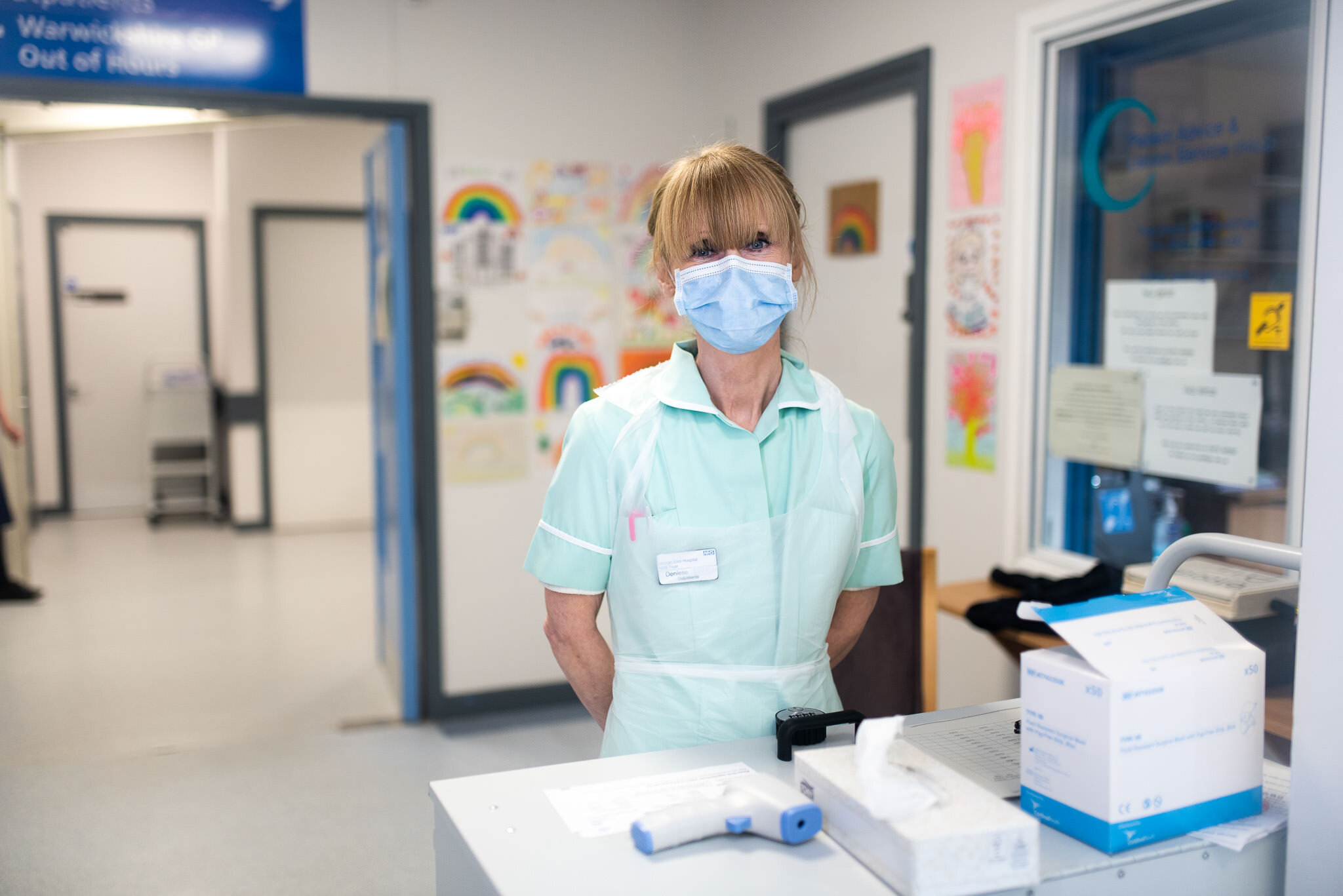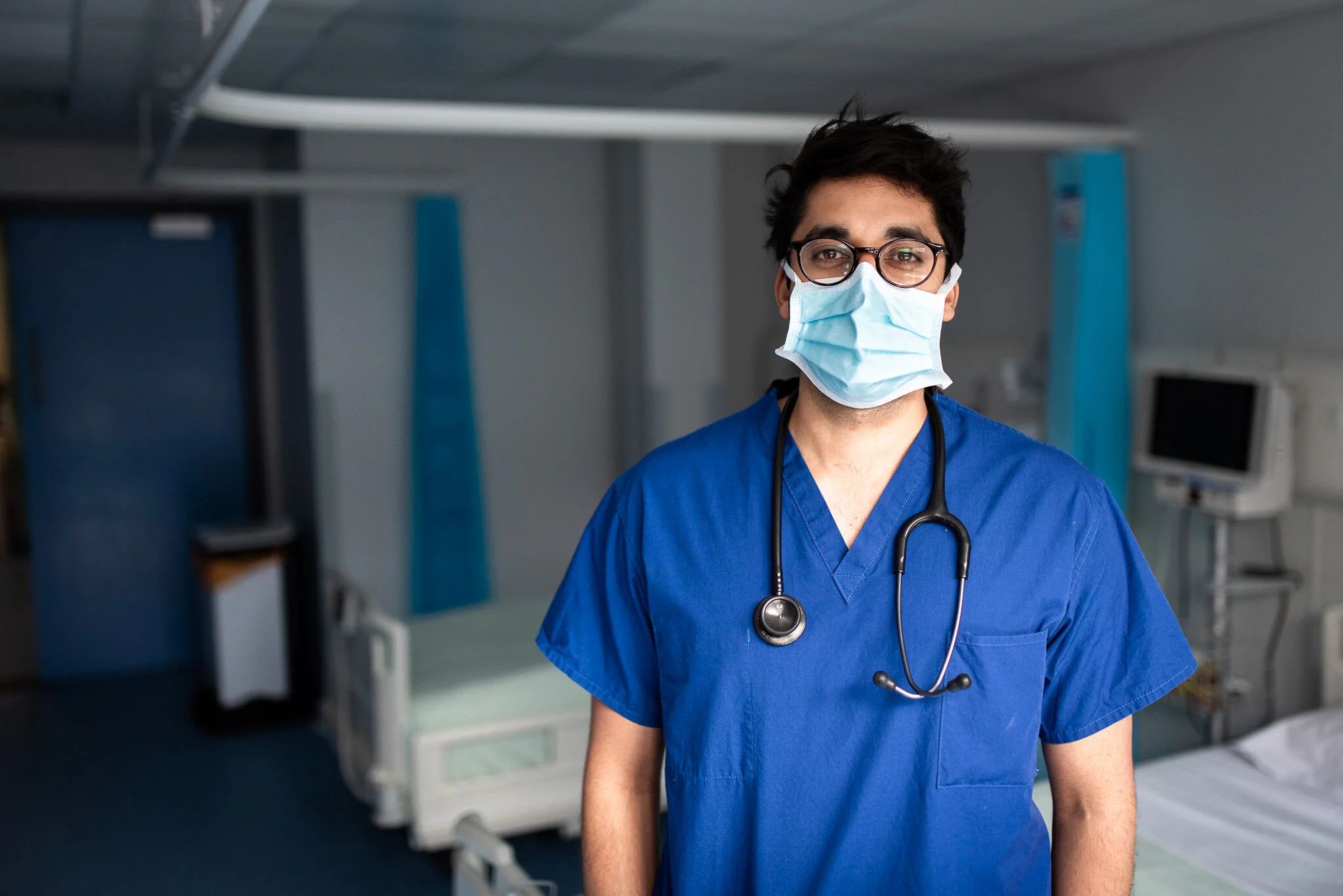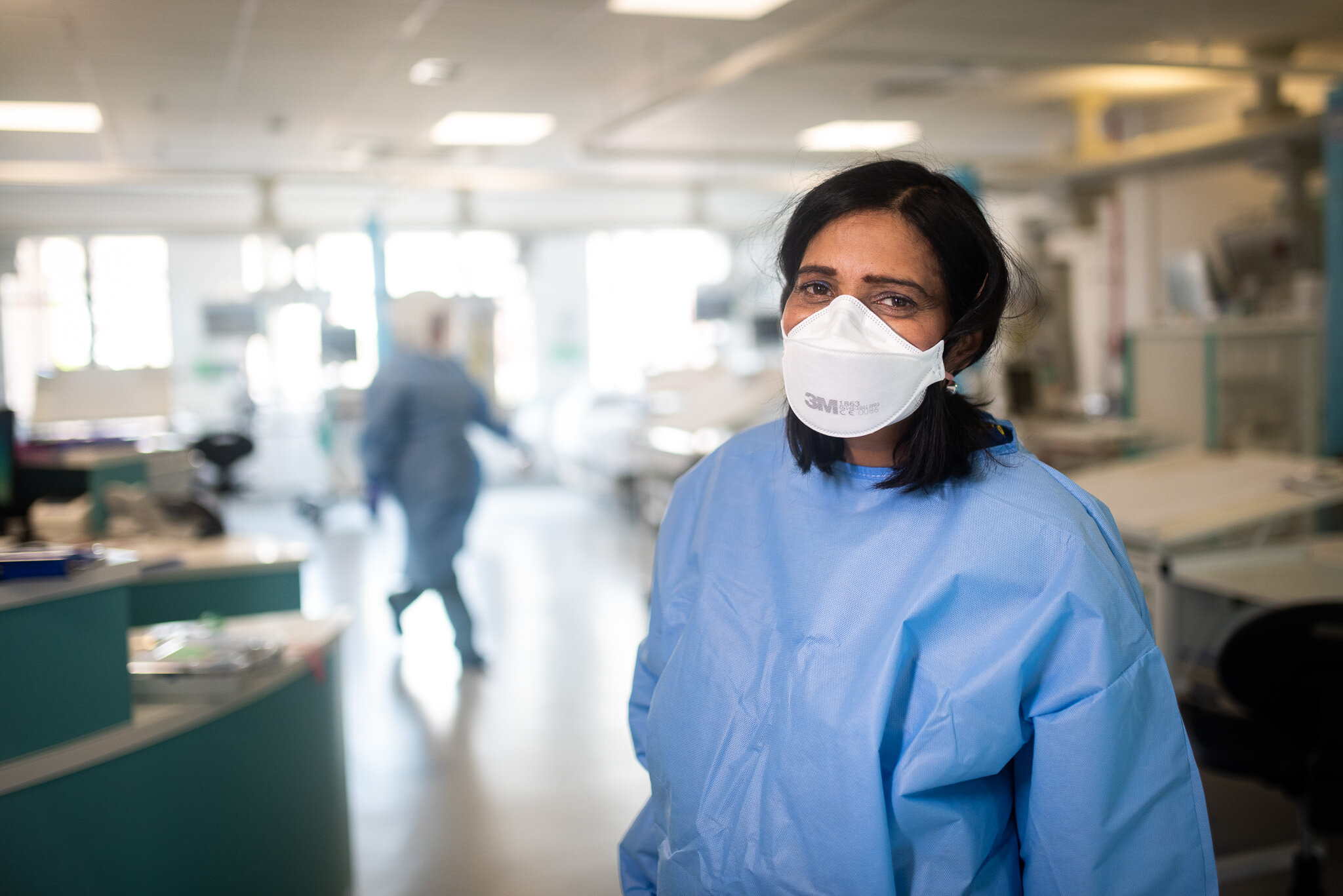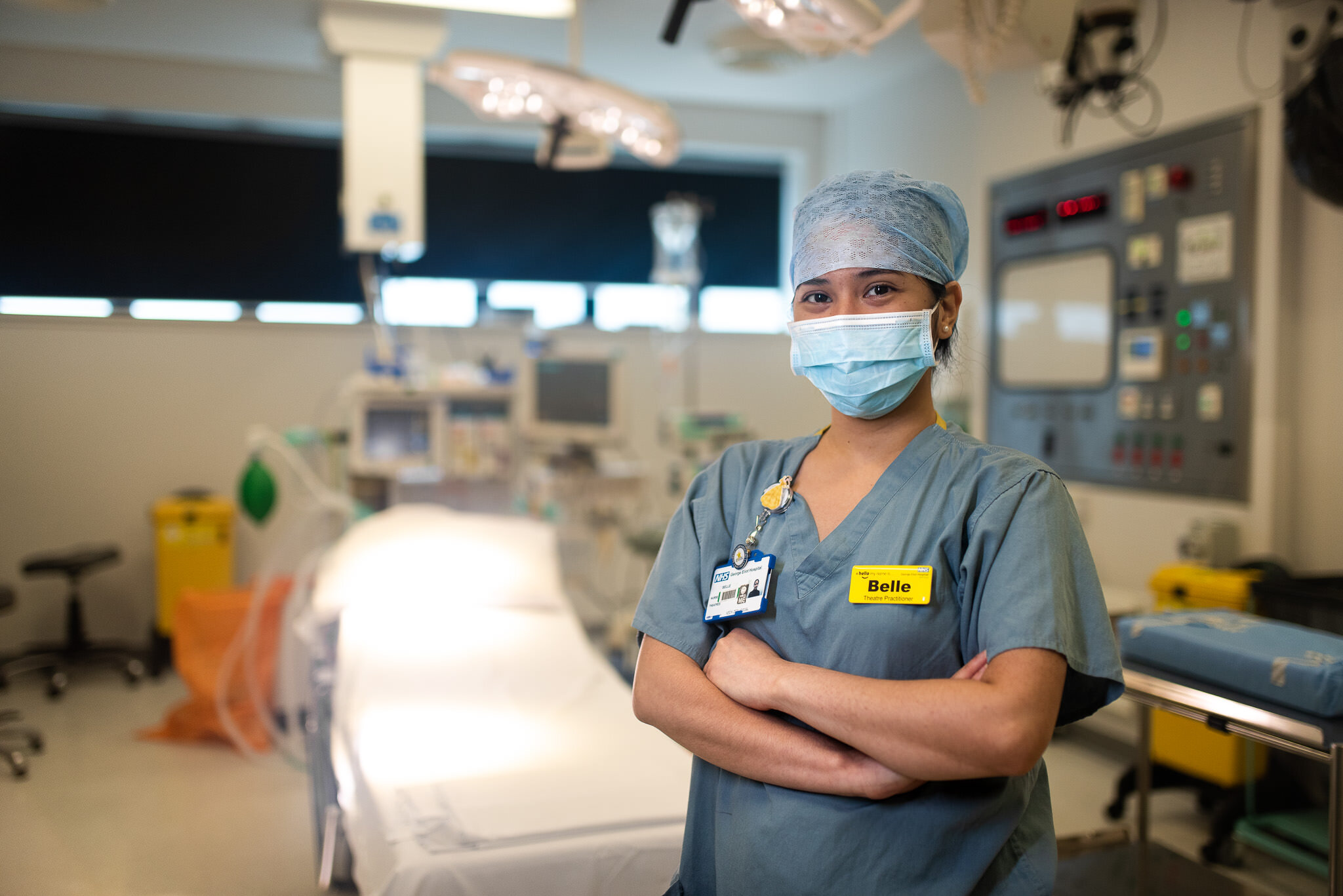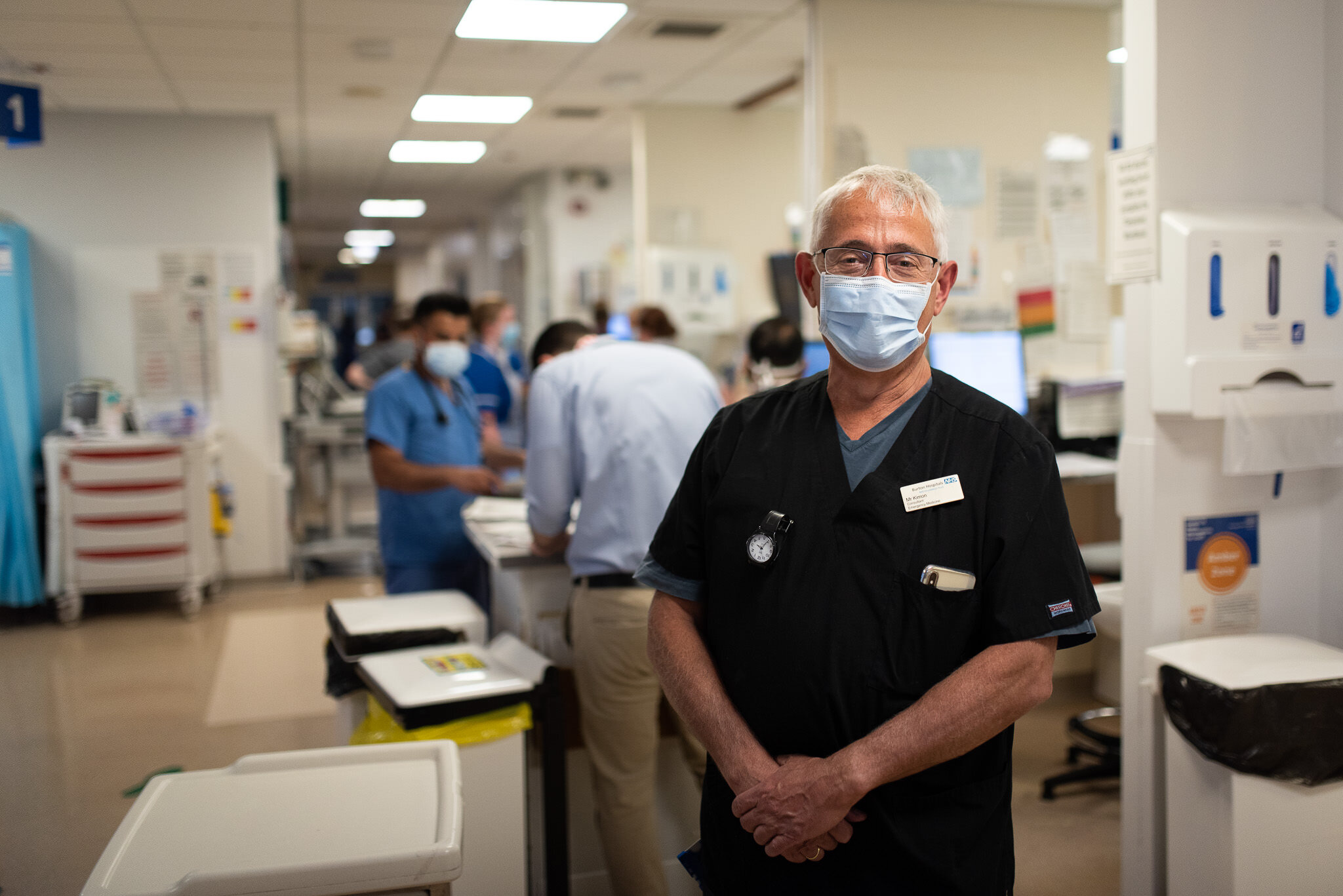
Humans of the Pandemic
Part C
Welcome to the third selection in Humans of the Pandemic.
During the first COVID-19 pandemic lockdown, medical student Matthew Thompson photographed portraits of 67 staff across NHS George Eliot Hospital. Inspired by what he saw while working on the respiratory ward, Matthew tried to meet and feature someone in every role that had changed, adapted or run at capacity to play an often hidden part in patient care. He soon discovered there were far more than he expected.
This is the first of three parts in this series, featuring 23 staff. Photographed between April and August 2020, each participant features two photos where possible and appropriate, according to their location and guidelines at the time the photo was taken: one with their PPE donned and one with their face revealed briefly. Some participants have been kind enough to share their thoughts and feelings about working during the “first wave” of the pandemic.
Avril
Acute Medical Unit (AMU) Nurse
Avril felt "overwhelmed, afraid, out of my depth, but vital and part of an amazing team." She described how "everything changed. We have looked for some of the sickest patients with the lowest NEWS. It’s meant really embracing our clinical knowledge and experience to act on patient deterioration. We had to quickly learn new skills and techniques including prone positioning and CPAP. We had to talk families through EOL process over the phone and help them come to terms with their loved ones' end remotely. Lack of visitors has made the whole hospital seem quiet and lonely, giving a false sense of tranquility, when in fact we’ve been dealing with a horrific amount of tragedy."
Danielle
Research Study Site Coordinator
All of Danielle's research studies have paused to focus on COVID-19, with more patients enrolled than usual. She has felt a "mixture of emotions" and hopes her increased workload will lead to potential treatments sooner. She's concerned about the long-term consequences of the pandemic on the NHS.
Dawn
Lead Radiographer - X-ray
Dawn was anxious about keeping her family safe as she worked, while keeping her "work family's morale high" and feeling safe. She is very proud of her team and thinks "we have done our absolute best to get through this pandemic despite some very great personal tragedies." She "would like to think that the general public will remember how much we cared for them at this time, even when our waiting times creep up again."
Deniese
Outpatients Healthcare Support Worker
Dolores
Ward Clerk
As a ward clerk, Dolores is "now an even more important link between patients' and their relatives, as because they can't visit, [she] is the first point of contact when they call the ward". She hopes public support will continue and that the staff's commitment will be recognised as the "backbone" of the NHS.
Emma
Midwife
Kirsty
COVID Emergency Dept. Nurse
Jackie is concerned there will be a "massive impact on the NHS going forward", as patients are "waiting for electives [that] have been put on hold", "frightened of going to their GPs", and may have serious diagnoses delayed. As a nurse, she hopes kindness will continue, increased "hand washing may reduce other infection spread", and that staff's new skils "will continue to improve care".
James
Head of Communications & Engagement
Jonathon
Porter
Jonathan has felt "very calm" as a porter during the pandemic, only having to adapt to wearing PPE. He believes "we have pulled together to keep things going" in this "very challenging time" and hopes learning from this experience will "help us be ready for the future".
Jo
Cardiorespiratory Physiologist
Jo felt a "mix of tired, worry, and concern" as her role as a cardiopulmonary physiologist shifted from working with outpatients to COVID patients on the wards." She hopes A&E will be used more responsibly in the future and that some new ways of working will continue.
Julie
Theatre Operating Department Practitioner (ODP) - Team Leader
Julie felt anxious and apprehensive about each following day during the pandemic. She updated her skills to enable her to work alongisde ITU nurses as non-emergency surgeries were postponed. She finds it "hard to explain the utter sadness and the feeling of helplessness knowing the patients' pathways, for both the patients and their loved ones."
Kimon
A&E Consultant Doctor
Kimon returned from retirement feeling "a little vulnerable" and "scared of being infected, but glad that I returned to help." He found "COVID changed all the usual processes and procedures that one usually took for granted" and "witnessing patient not get what they deserved was very stressful at times." He believes the "NHS was chronically deprived by a decade of austerity" but "a profound sense of duty and camaraderie has saved it." He hopes for "a vast increase in appropriately directed public funding" for COVID and non-COVID services.
Krishan
Theatres Operating Department Practitioner (ODP)
First-year doctor Krishan feels "proud to be part of such an amazing team" as he spends more time "working on unfamiliar wards, with new colleagues". He hopes the "team spirit and togetherness" will continue after this "significant challenge, the likes of which we have not seen in our lifetimes."
Laura
Cardiology Nurse
Lawrence
Medical Student - Third Year
Lawrence sums up his feeling as "worried, intrigued, bored and impatient" as he "went from being on a normal medical school placement to working as a paid support worker in less than three weeks." He found this "enjoyable and a great additional experience to have during my training" and hopes "more medical students get a similar opportunity." He is concerned about the backlog of cancer care and elective surgery.
Matthew
Lead Radiographer
Matthew felt initially "scared and very apprehensive about coming to work [as a radiographer, but] soon began to enjoy work [as] just those patients who were very sick were coming through A&E." He hopes that "people don't start to abuse A&E again, since it is being used correctly at the moment." He believes staff deserve greater pay since "we have proved our worth."
Melissa
Bereavement Administrator
Seconded to the Bereavement team, Melissa felt a "mixture of emotions: frustrated, lucky to still be working and having my health, upset that I can't see family or friends, angry with the mixed messages about what we can and can't do." She hopes "the NHS continues to get the recognition, support and help it needs [and] speaking to each other more."
Michelle
Respiratory Ward Healthcare Support Worker
Michelle has "felt a rollercoaster of emotions [such as] scared, overwhemed and sad." As a healthcare support worker, she has adapted to PPE and using CPAP machines on the COVID positive ward, describing it as "very emotional dealing with poorly patients who can't have family contact [and] very sad watching some pass without being held by loved ones."
Pippa
Dietician
Pritesh
Pharmacy Technician
Ravinder
Patient Advice & Liaison (PALS) Officer
Ron
Senior Mortuary Technician
Ron felt "concerned" during the pandemic. As a Senior Mortuary Technician, his role become "a lot more complex" as he worked in a "severely under pressure and massively underfunded" NHS.



